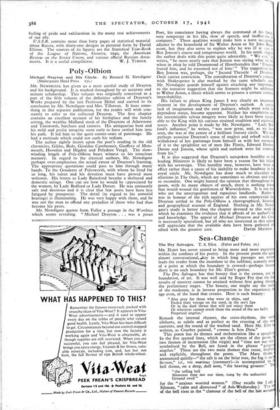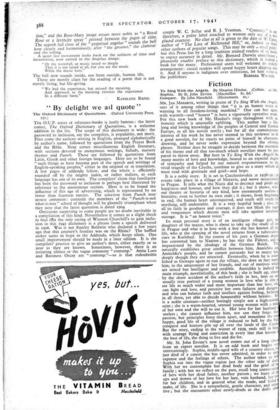Sea-Change - The Dry Salvages. T. S. Eliot. (Faber and
Faber. Is.) MR. ELIOT has never ceased to bring more and more experien within the confines of his poetry. In the present poem the qui almost conversational,okey in which • long passages are write leads the reader from the mundane to the sublime, scarcely aw of a point at which the boundary is crossed—perhaps beta there is no such boundary for Mr. Eliot's genius.
The Dry Salvages has that beauty that is the crown, not foundation, of art. It was well said by Roger Fry that the results of mastery cannot be attained without first going throw the preliminary stages. The beauty, one might say the you of the madonna, is in inverse proportion to the experience, t age even, of the hand that creates. Here is such beauty : " Also pray for those who were in ships, and
Ended their voyage on the sand, the sea's lips Or in the dark throat that will not reject them Or wherever cannot reach them the sound of the sea bell's Perpetual angelus."
Remark the internal rhymes, the cross-rhythms, the var. sibilants, as subtle and as perfect as the crossing of the wa currents, and the sound of the washed sand. Here Mr. Eliot written, as Courbet painted, "comme le bon Dieu." This poem has its themes and orchestration like a symphon In the five quoted lines, which are the climax of the poem. two themes of incarnation (the virgin) and " time not our t symbolised by the Bell, are fused in the phrase " perpe angelus." These are the two main Themes that recur, implici and explicitly, throughout the poem. The Mary theme announced quietly—" the salt is on the briar rose, the fog is on fir-tree," i.e., ros marinas (rosemary)—is accompanied by bell theme, on a deep, dull note, " the heaving groaner."
" the tolling bell
Measures time not our time, rung by the unhurried Ground swell " for the " anxious worried women." (One recalls the LaelY Silences, " calm and distressed" of Ash-Wednesday.) The n' of the bell rises in the " clamour of the bell of the last annuli Lion," and the Rose-Mary image recurs more nobly as " a Royal Rose or a lavender spray " pressed between the pages of rime. The superb full close of the " perpetual angelus " sounds the bell how clearly and harmoniously, after "the groaner," the clamour and the tolling. A quiet last movement looks back on the subjects of time and incarnation, now united in the Angelus image.
" Or the waterfall, or music heard so deeply That it is not heard at all, but you are the music While the music lasts." •
The bell now sounds inside, not from outside, human life. These are merely clues for the reading of a poem that is not merely living, but life-giving.
" We had the experience, but missed the meaning, And approach to the meaning restores the experience In a different form."
KATHLEEN RAINE.



























 Previous page
Previous page